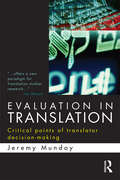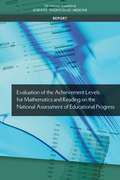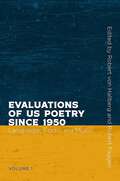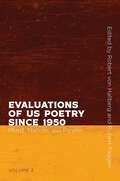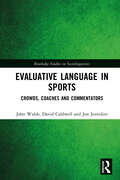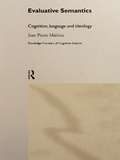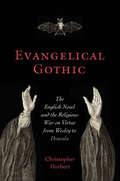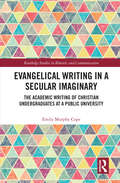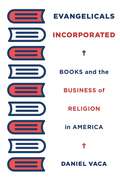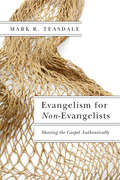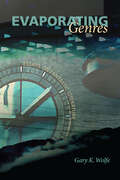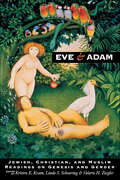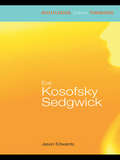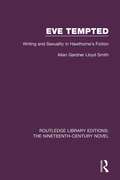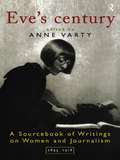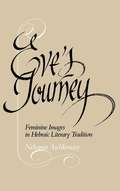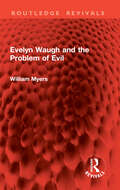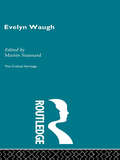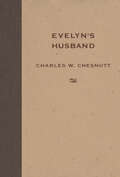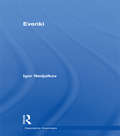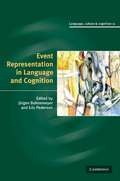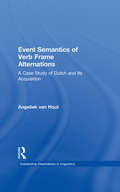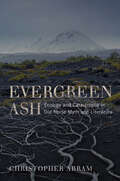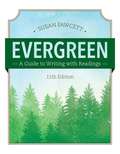- Table View
- List View
Evaluation in Translation: Critical points of translator decision-making
by Jeremy MundayIn this book, Jeremy Munday presents advances towards a general theory of evaluation in translator decision-making that will be of high importance to translator and interpreter training and to descriptive translation analysis. By ‘evaluation’ the author refers to how a translator’s subjective stance manifests itself linguistically in a text. In a world where translation and interpreting function as a prism through which opposing personal and political views enter a target culture, it is crucial to investigate how such views are processed and sometimes subjectively altered by the translator. To this end, the book focuses on the translation process (rather than the product) and strives to identify more precisely those points where the translator is most likely to express judgment or evaluation. The translations studied cover a range of languages (Arabic, Chinese, Dutch, French, German, Indonesian, Italian, Japanese, Russian, Spanish and American Sign Language) accompanied by English glosses to facilitate comprehension by readers. This is key reading for researchers and postgraduates studying translation theory within Translation and Interpreting Studies.
Evaluation of the Achievement Levels for Mathematics and Reading on the National Assessment of Educational Progress
by Engineering Medicine National Academies of SciencesSince 1969, the National Assessment of Educational Progress (NAEP) has been providing policymakers, educators, and the public with reports on academic performance and progress of the nation’s students. The assessment is given periodically in a variety of subjects: mathematics, reading, writing, science, the arts, civics, economics, geography, U.S. history, and technology and engineering literacy. NAEP is given to representative samples of students across the U.S. to assess the educational progress of the nation as a whole. Since 1992, NAEP results have been reported in relation to three achievement levels: basic, proficient, and advanced. However, the use of achievement levels has provoked controversy and disagreement, and evaluators have identified numerous concerns. This publication evaluates the NAEP student achievement levels in reading and mathematics in grades 4, 8, and 12 to determine whether the achievement levels are reasonable, reliable, valid, and informative to the public, and recommends ways that the setting and use of achievement levels can be improved.
Evaluations of US Poetry since 1950, Volume 1: Language, Form, and Music (Recencies Series: Research and Recovery in Twentieth-Century American Poetics)
by Robert von Hallberg and Robert FaggenOver the last sixty years scholars and critics have focused on literary history and interpretation rather than literary value. When value is addressed, the standards are usually political and identitarian. The essays collected in both volumes of Evaluations of US Poetry since 1950 move away from esoteric literary criticism toward a more evaluative and speculative inquiry that will serve as the basis from which poets will be discussed and taught over the next half-century and beyond. Von Hallberg and Faggen have curated a diverse selection of authors to explore this topic. Volume 1 focuses on voice, language, form, and musicality. Stephen Yenser writes about Elizabeth Bishop, Stephanie Burt about C. D. Wright, Nigel Smith about Paul Simon, and Marjorie Perloff about Charles Bernstein, among others. The essays do not provide an exhaustive survey of recent poetry. Instead, Evaluations of US Poetry since 1950 presents readers with more than thirty different models of literary absorption and advocacy. This is done in explicit hope of reorienting the criticism of poetry.
Evaluations of US Poetry since 1950, Volume 2: Mind, Nation, and Power (Recencies Series: Research and Recovery in Twentieth-Century American Poetics)
by Robert von Hallberg and Robert FaggenHorace speaks of poetry delighting and instructing. While Evaluations of US Poetry since 1950, Volume 1 explores the pleasures of poetry—its language, forms, and musicality—volume 2 focuses on the public dimensions. In this volume, von Hallberg and Faggen have gathered a diverse selection of poets to explore questions such as: How does poetry instruct a society with a highly evolved knowledge industry? Do poems bear a relation to the disciplined idioms of learning? What do poets think of as intellectual work? What is the importance of recognizable subject matter? What can honestly be said by poets concerning this nation so hungry for learning and so fixated on its own power? To these questions, the literary critics collected here find some answers in the poetry of Robert Pinsky, Susan Howe, Robert Hass, Anthony Hecht, Adrienne Rich, Sharon Olds, Ed Dorn, and August Kleinzahler.
Evaluative Language in Sports: Crowds, Coaches and Commentators (Routledge Studies in Sociolinguistics)
by John Walsh David Caldwell Jon JureidiniWalsh, Caldwell and Jureidini offer an expansive linguistic perspective on the evaluative language prevalent in the world of professional sports.This book presents a close linguistic analysis of evaluative language in sport. Drawing on appraisal theory and data from three distinct sporting contexts – songs and chants in football stadiums, television commentary and coach discourse – it examines the critical role played by affectual, judgemental and appreciative language. In the spirit of sociolinguistics, this book also considers the history and culture of the respective sporting contexts. Connections are made between the evaluative language expressed by supporters, commentators and coaches and the invocation of power and solidarity. Evaluative Language in Sports gives insight into some of the key language practices that contribute to professional sports culture: a communal and combative world of winners and losers, ‘us and ‘them’.An innovative and valuable book that will appeal to students, researchers and sports enthusiasts interested in sports communication and language, sociolinguistics and media studies.
Evaluative Semantics: Cognition, Language and Ideology (Frontiers of Cognitive Science)
by Jean-Pierre MalrieuEvaluation, from connotations to complex judgements of value, is probably the most neglected dimension of meaning. Calling for a new understanding of truth and value, this book is a comprehensive study of evaluation in natural language, at lexical, syntactic and discursive levels. Jean Pierre Malrieu explores the cognitive foundations of evaluation and uses connectionist networks to model evaluative processes. He takes into account the social dimension of evaluation, showing that ideological contexts account for evaluative variability. A discussion of compositionality and opacity leads to the argument that a semantics of evaluation has some key advantages over truth-conditional semantics and as an example Malrieu applies his evaluative semantics to a complex Shakespeare text. His connectionist model yields a mathematical estimation of the consistency of text with ideology, and is particularly useful in the identification of subtle rhetorical devices such as irony.
Evangelical Gothic: The English Novel and the Religious War on Virtue from Wesley to Dracula (Victorian Literature and Culture Series)
by Christopher HerbertEvangelical Gothic explores the bitter antagonism that prevailed between two defining institutions of nineteenth-century Britain: Evangelicalism and the popular novel. Christopher Herbert begins by retrieving from near oblivion a rich anti-Evangelical polemical literature in which the great religious revival, often lauded in later scholarship as a "moral revolution," is depicted as an evil conspiracy centered on the attempted dismantling of the humanitarian moral culture of the nation. Examining foundational Evangelical writings by John Wesley and William Wilberforce alongside novels by Charles Dickens, George Eliot, Bram Stoker, and others, Herbert contends that the realistic popular novel of the time was constitutionally alien to Evangelical ideology and even, to some extent, took its opposition to that ideology as its core function. This provocative argument illuminates the frequent linkage of Evangelicalism in nineteenth-century fiction with the characteristic imagery of the Gothic–with black magic, with themes of demonic visitation and vampirism, and with a distinctive mood of hysteria and panic.
Evangelical Writing in a Secular Imaginary: The Academic Writing of Christian Undergraduates at a Public University (Routledge Studies in Rhetoric and Communication)
by Emily Murphy CopeEvangelical Writing in a Secular Imaginary addresses the question of how Christian undergraduates engage in academic writing and how best to teach them to participate in academic inquiry and prepare them for civic engagement. Exploring how the secular both constrains and supports undergraduates’ academic writing, the book pays special attention to how it shapes younger evangelicals’ social identities, perceptions of academic genres, and rhetorical practices. The author draws on qualitative interviews with evangelical undergraduates at a public university and qualitative document analysis of their writing for college, grounded in scholarship from social theory, writing studies, sociology of religion, rhetorical theory, and social psychology, to describe the multiple ways these evangelicals participate in the secular imaginary that is the public university through their academic writing. The conception of a “secular imaginary” provides an explanatory framework for examining the lived experiences and academic writing of religious students in American institutions of higher education. By examining the power of the secular imaginary on academic writers, this book offers rhetorical educators a more complex vocabulary that makes visible the complex social forces shaping our students’ experiences with writing. This book will be of interest not just to scholars and educators in the area of rhetoric, writing studies and communication but also those working on religious studies, Christian discourse and sociology of religion.
Evangelicals Incorporated: Books and the Business of Religion in America
by Daniel VacaAmerican evangelicalism is big business. It is not, Daniel Vaca argues, just a type of conservative Protestantism that market forces have commodified. Rather evangelicalism is an expressly commercial practice, in which the faithful participate, learn, and develop religious identities by engaging corporations and commercial products.
Evangelism for Non-Evangelists: Sharing the Gospel Authentically
by Mark R. TeasdaleWe have met evangelists—and they are not us. Sympathetic to the discomfort his students have about evangelism, Mark Teasdale gives us this refreshing, practical look at sharing the good news. He opens up a nonthreatening space, helping us learn how to express the gospel in a manner true to what we believe, authentic to who we are, and compelling to others.
Evaporating Genres: Essays on Fantastic Literature
by Gary K. WolfeIn this wide-ranging series of essays, an award-winning science fiction critic explores how the related genres of science fiction, fantasy, and horror evolve, merge, and finally "evaporate" into new and more dynamic forms. Beginning with a discussion of how literary readers "unlearned" how to read the fantastic during the heyday of realistic fiction, Gary K. Wolfe goes on to show how the fantastic reasserted itself in popular genre literature, and how these genres themselves grew increasingly unstable in terms of both narrative form and the worlds they portray. More detailed discussions of how specific contemporary writers have promoted this evolution are followed by a final essay examining how the competing discourses have led toward an emerging synthesis of critical approaches and vocabularies. The essays cover a vast range of authors and texts, and include substantial discussions of very current fiction published within the last few years.
Eve & Adam: Jewish, Christian, and Muslim Readings on Genesis and Gender
by Kristen E. Kvam, Linda S. Schearing and Valarie H. Ziegler“The editors have performed a great service in making widely available a documentary history of the interpretation of the Eve and Adam story.” —Publishers WeeklyNo other text has affected women in the western world as much as the story of Eve and Adam. This remarkable anthology surveys more than 2,000 years of Jewish, Christian, and Muslim commentary and debate on the biblical story that continues to raise fundamental questions about what it means to be a man or to be a woman. The selections range widely from early postbiblical interpretations in the Apocrypha and Pseudepigrapha to the Qur’an, from Thomas Aquinas to medieval Jewish commentaries, from Christian texts to nineteenth-century antebellum slavery writings, and on to pieces written especially for this volume.“This fascinating volume examines Genesis 1–3 and the different ways that Jewish, Christian, and Muslim interpreters have used these passages to define and enforce gender roles. . . . a ‘must’ “—Choice“Wonderful! A marvelous introduction to the ways in which the three major Western religious traditions are both like, and unlike one another.” —Ellen Umansky, Fairfield University
Eve Kosofsky Sedgwick: Eve Kosofsky Sedgwick As A Poet (Routledge Critical Thinkers)
by Jason EdwardsEve Kosofsky Sedgwick was one of the most significant literary theorists of the last forty years and a key figure in contemporary queer theory. In this engaging and inspiring guide, Jason Edwards: introduces and explains key terms such as affects, the first person, homosocialities, and queer taxonomies, performativities and cusps considers Sedgwick’s poetry and textile art alongside her theoretical texts encourages a personal as well as an academic response to Sedgwick’s work, suggesting how life-changing it can be offers detailed suggestions for further reading Written in an accessible and direct style, Edwards indicates the impact that Sedgwick’s work continues to have on writers, readers, and literary and cultural theory today.
Eve Tempted: Writing and Sexuality in Hawthorne's Fiction (Routledge Library Editions: The Nineteenth-Century Novel #19)
by Allan Gardner Lloyd SmithFirst published in 1984, this book offers a unique interpretation of Hawthorne’s work, making use of perspectives opened up by Derrida in his work on Rousseau. It offers a psycho-biography of the author as discoverable in the texts and avoids a simplistic Freudian analysis. In doing so, it illuminates the work and re-opens Hawthorne’s texts to creative discussion. This book will be of interest to those studying 19th century literature.
Eve's Century: A Sourcebook of Writings on Women and Journalism 1895-1950
by Anne VartyThis unique collection of extracts is taken from women's journals and magazines - both British and American - on the eve of the twentieth century. Arranged by subject, the collection focuses on what this pivotal moment represented for women and includes an introduction to women's journalism of the period. The rapidly changing conditions then surrounding a woman's world are illustrated here by sections on: * monarchy * women and war * colonial women * the politics of emancipation * and girlhood.
Eve's Journey
by Nehama AschkenasyIn Eve's Journey, Nehama Aschkenasy traces the migration of several female images and feminine situations from their early appearances in Biblical writings to their incarnations in modern Hebraic literature. Focusing on the evolution of early female archetypes and prototypes, Aschkenasy uncovers the ancient roots of modern female characters and traces the changing cultural perceptions of women in Hebraic letters.The author draws on the vast body of Hebraic literary documents to illustrate how the female character is a mirror of her times as well as being a product of her creator''s imagination and conception of the woman's role in society and in fiction. The historical spectrum, provided by a discussion of Biblical narratives, Midrashic sources, documents of the Jewish mystics, Hasidic tales, and modern Hebrew works, allows an understanding of the metamorphosis that the female figure has experienced in her literary odyssey.
Evelyn Waugh and the Problem of Evil (Routledge Revivals)
by William MyersOriginally published in 1991, this elegantly written book offers new readers a useful approach to the work of Evelyn Waugh and will persuade those familiar with it to look at it afresh. This introduction to Waugh’s novels places them high in the catalogue of great fiction. It claims for them an intellectual coherence, subtlety and seriousness which Waugh’s disconcerting comic gifts and extravagant public and writing persona have tended to put in the shade. In addressing the nature of Waugh’s comic writing William Myers has borrowed George Bataille’s concept of Evil as a convenient way of dealing with the most troubling and exciting aspects of Waugh’s work: its sadism, its childish irresponsibility, its fascination with lunacy and death.
Evelyn Waugh: The Later Years, 1939-1966 (Complete Works Of Evelyn Waugh Ser.)
by Martin StannardThis set comprises 40 volumes covering nineteenth and twentieth century European and American authors. These volumes will be available as a complete set, mini boxed sets (by theme) or as individual volumes. This second set compliments the first 68 voulme set of Critical Heritage published by Routledge in October 1995.
Evelyn's Husband
by Charles W. ChesnuttThe critique of white male society that Charles W. Chesnutt launched in A Marrow of Tradition continues in Evelyn's Husband, one of six manuscripts left unpublished when this highly regarded African American innovator died. Set in Boston society, on a deserted Caribbean island, and in Brazil, Evelyn's Husbandis the story of two men—one old, one young—in love with the same young woman. Late in his career Chesnutt embarked on a period of experimentation with eccentric forms, finishing this hybrid of a romance and adventure story just before publishing his last work, The Colonel's Dream. In Evelyn's Husband, Chesnutt crafts a parody examining white male roles in the early 1900s, a time when there was rampant anxiety over the subject. In Boston, the older man is left at the altar when his bride-to-be flees and marries a young architect. Later, trapped on an island together, the jilted lover and the young husband find a productive middle ground between the dilettante and the primitive. Along with A Business Career, this novel marks Chesnutt's achievement in being among the first African American authors to defy the color barrier and write fiction with a white cast of main characters.
Evenki (Descriptive Grammars)
by Igor NedjalkovEvenki is one of nine Tungusic languages spoken in Siberia and Northern China. This book gives the first ever complete description of all this language's linguistic domain. Evenki is remarkable both for the vast area where it is spoken - from Western Siberia through the Amur region to the shores of the Arctic Ocean to Northern China - and for its immense number of dialects and sub-dialects.
Event Representation in Language and Cognition
by Jürgen Bohnemeyer Eric PedersonEvent Representation in Language and Cognition examines new research into how the mind deals with the experience of events. Empirical research into the cognitive processes involved when people view events and talk about them is still a young field. The chapters by leading experts draw on data from the description of events in spoken and signed languages, first and second language acquisition, co-speech gesture and eye movements during language production, and from non-linguistic categorization and other tasks. The book highlights newly found evidence for how perception, thought, and language constrain each other in the experience of events. It will be of particular interest to linguists, psychologists, and philosophers, as well as to anyone interested in the representation and processing of events.
Event Semantics of Verb Frame Alternations: A Case Study of Dutch and Its Acquisition (Outstanding Dissertations in Linguistics)
by Angeliek Van HoutUsing both theoretical and language acquisition arguments, this study proposes a new model of the lexicon-syntax interface defined in terms of checking event-semantic features. The research is based on Dutch verbs and their possible verb frames (intransitive, transitive, etc.) and two studies of children's Dutch. The model developed from these cases represents more generally the way in which Universal Grammar organizes the lexicon of a language and the mapping system that associates a verb's lexical features with its syntactic projection.
Evergreen Ash: Ecology and Catastrophe in Old Norse Myth and Literature (Under the Sign of Nature)
by Christopher AbramNorse mythology is obsessed with the idea of an onrushing and unstoppable apocalypse: Ragnarok, when the whole of creation will perish in fire, smoke, and darkness and the earth will no longer support the life it once nurtured. Most of the Old Norse texts that preserve the myths of Ragnarok originated in Iceland, a nation whose volcanic activity places it perpetually on the brink of a world-changing environmental catastrophe. As the first full-length ecocritical study of Old Norse myth and literature, Evergreen Ash argues that Ragnarok is primarily a story of ecological collapse that reflects the anxieties of early Icelanders who were trying to make a home in a profoundly strange, marginal, and at times hostile environment.Christopher Abram here contends that Ragnarok offers an uncanny foreshadowing of our current global ecological crisis—the era of the Anthropocene. Ragnarok portends what may happen when a civilization believes that nature can be mastered and treated only as a resource to be exploited for human ends. The enduring power of the Ragnarok myth, and its relevance to life in the era of climate change, lies in its terrifying evocation of a world in which nothing is what it was before, a world that is no longer home to us—and, thus, a world with no future. Climate change may well be our Ragnarok.
Evergreen: A Guide To Writing With Readings (Eleventh Edition)
by Susan FawcettMillions of students have become stronger, more confident writers with Evergreen. Its unsurpassed coverage of writing, grammar, and critical thinking have made the book a leader in the market and beloved by instructors and students alike.
